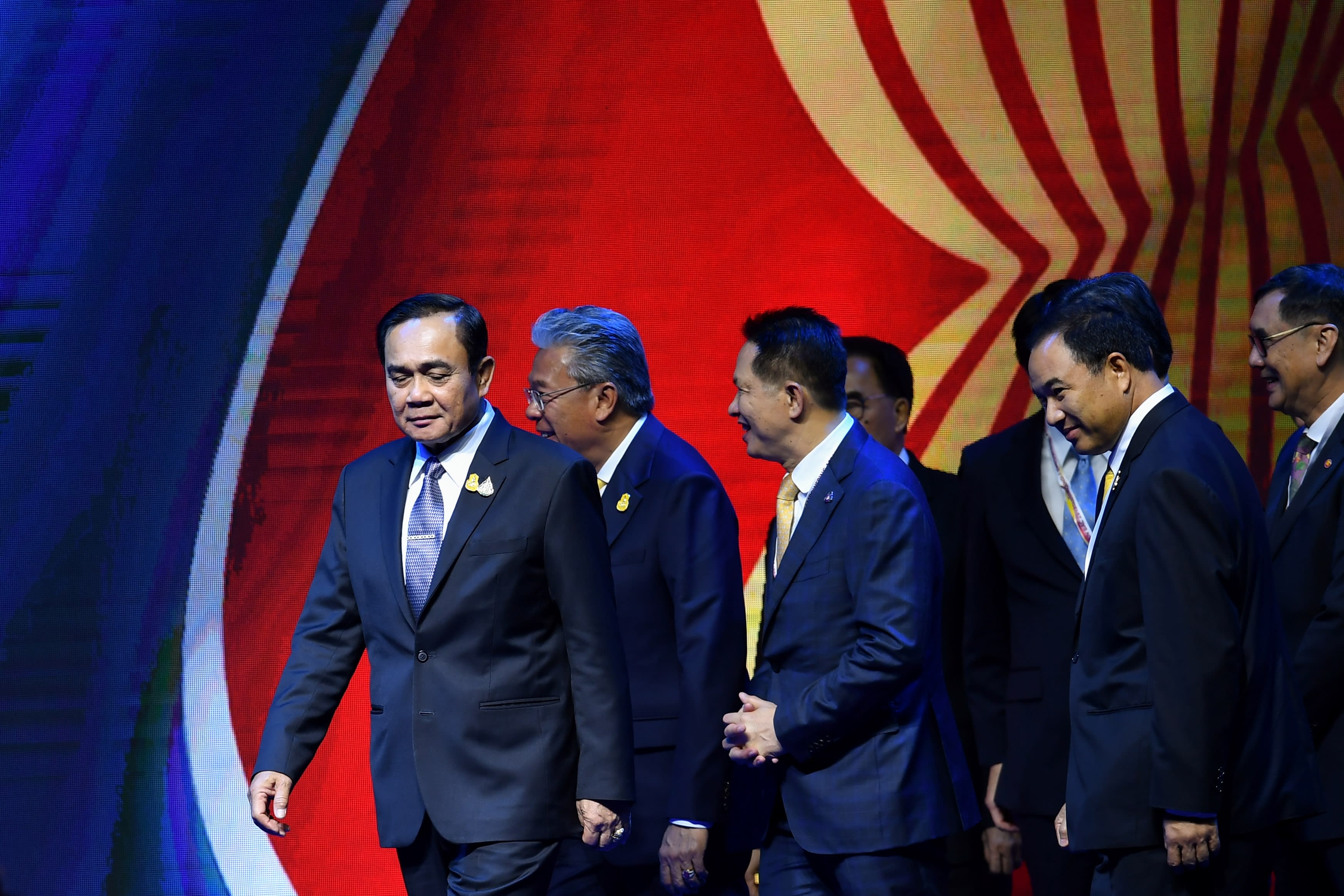
Thailand prime minister Prayut Chan-O-Cha and guests leave the stage at a business forum on the sidelines of the 35th Association of Southeast Asian Nations (ASEAN) summit in Bangkok on November 2, 2019.
Lillian Suwanrumpha | AFP | Getty Images
Southeast Asian countries are committed to signing a mega Asia Pacific trade pact in 2020 that would form a major trading bloc covering a third of the world’s gross domestic product, according to Thailand.
Many were hoping that at least some “substantial conclusion” to the years-long negotiations over the 16-member Regional Comprehensive Economic Partnership would be reached in Bangkok. Leaders of the Association of Southeast Asian Nations are in Thailand for the 35th ASEAN Summit as well as meetings with major trading partners like China and India.
Thailand, which currently holds the ASEAN chairmanship, said Sunday in a statement that the group “welcomed the conclusion of the Regional Comprehensive Economic Partnership (RCEP) negotiations and the commitment to sign the RCEP Agreement in 2020.”
“This will significantly contribute to an open, inclusive and rules-based international trading system and expansion of value chains,” it said.
In his opening remarks, Thai Prime Minister Prayut Chan-o-cha urged member states to work toward reaching a conclusion to RCEP negotiations within this year to “stimulate economic growth,” trade and investment.
Separately, Reuters reported that Thai government spokeswoman Narumon Pinyosinwat told reporters on Sunday that commerce ministers were still discussing outstanding issues and that it would be announced when a conclusion was reached.
She said the signing of the agreement was expected around February 2020 and Thai Commerce Minister, Jurin Laksanawisit, added India had not pulled out, according to Reuters.
India’s reluctance to open up its markets has been one of the major sticking factors in the talks, which started in 2013.
Waiting on India’s decision
RCEP involves all ten Southeast Asian nations and six of their large trading partners: China, Japan, South Korea, India, Australia, and New Zealand.
If all 16 countries come together to form a trading bloc, it would cover about a third of the world’s gross domestic product and provide new market access for goods and services as well as investment opportunities for companies.
India is worried that the agreement, which requires the gradual elimination of tariffs, will open up the country’s domestic markets to a flood of cheap Chinese goods and agricultural produce from Australia and New Zealand that will harm its local producers.
In his opening remarks at the ASEAN-India summit on Sunday, Indian Prime Minister Narendra Modi did not mention the ongoing RCEP negotiations. Instead, he spoke about the ASEAN-India partnership and the decision to review his country’s trade agreement with the bloc. “This will not only make our economic relations more stronger, but our trade will also be balanced,” Modi said.
China’s interest in RCEP
For its part, China sees RCEP as an important piece in the greater economic integration of East Asia under its influence.
Beijing is currently locked in a trade war with the United States, where both sides have applied tariffs on billions of dollars worth of each other’s goods — the impact of the trade fight has slowed down global economic growth and created a wave of uncertainty for companies.
Some consider RCEP to be a less restrictive version of the now-defunct U.S.-led Trans-Pacific Partnership. The U.S. pulled out of the 12-member TPP in January 2017.
As much as we’d like to see RCEP done, we’d like to see our administration focus on getting deals done for the United States.
Charles Freeman
U.S. Chamber of Commerce
Following President Donald Trump‘s decision, the remaining countries drew up a new agreement called the Comprehensive and Progressive Agreement for Trans-Pacific Partnership, which incorporated most of TPP’s provisions.
When asked about what U.S. companies think about RCEP, Charles Freeman, senior vice president for Asia at the U.S. Chamber of Commerce, said the “concern is more about the fact that we haven’t come up with a replacement for the TPP strategy.”
“As much as we’d like to see RCEP done, we’d like to see our administration focus on getting deals done for the United States,” Freeman told CNBC’s “Squawk Box” on Monday.
The United States sent a downgraded delegation to Bangkok for the summits, and Commerce Secretary Wilbur Ross was the most senior official from the Trump administration in attendance.

